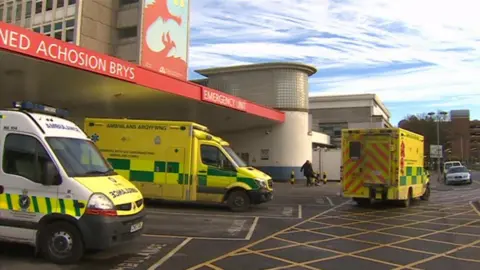A&E units in Wales see busiest ever August
 BBC
BBCThe number of patients using emergency departments in Wales in August was the highest on record for the month.
A total of 92,850 people were seen in A&E units, and this followed their busiest ever month in July, Welsh Government statistics show.
A total of 77.2% of patients were seen in A&E within the four-hour target time in August, slightly worse than July.
Wrexham Maelor Hospital again saw the worst performance in Wales, with only 51.7% of patients seen within target.
It has been the worst performing A&E, the target is for 95% to be seen.
Glan Clwyd Hospital saw a deterioration for the first time since April, with 58.7% of patients seen within four hours.
"We remain concerned about performance at a small number of hospitals and are working directly with them," said a Welsh Government spokesman.
The summer months traditionally bring more patients through the doors of A&E units, but the latest figures for hospitals in Wales are higher than those of 2017, which was the previous busiest August.
The figures also show:
- A total of 4,847 patients spent more than 12 hours in A&E waiting to be treated, transferred or discharged - this is slightly down on July.
- On the new single cancer pathway measure, 75.1% of patients suspected of having cancer started treatment within the 62-day target, compared to 74.4% in June.
- The average number of daily calls to the ambulance service fell. Responses to life-critical "red calls" within eight minutes met the target, but was below 70% for the second consecutive month.
- The numbers of patients waiting to start hospital treatment, which stands at 461,877, is the highest on record, with just over 87% waiting less than six months. The target is 95%.
Conservative health spokeswoman Angela Burns AM said: "Everyone I speak to is sick to the back teeth of this normalisation of long waits in A&E departments in Wales, and the health minister must take accountability for this continuous underperformance.
"It's also particularly devastating to see the hundreds of thousands of people in north Wales get left behind as they see a health board, four years deep into governmental intervention, stay in this purgatory."
The Welsh Government said a further rise in those waiting more than 36 weeks was "disappointing" but it expected to see improvements.
A spokesman added that hospitals had also once again seen record levels of demand on front-line emergency care services.
"We are working with partners to reduce this pressure in different ways," he said. "This includes helping more people to remain independent at home, focusing on vulnerable groups who need care the most and increasing capacity.
"Despite this pressure the vast majority of people still receive timely care, the ambulance targets were met and we continue to see and treat greater numbers of cancer patients, both in total and within target times."
